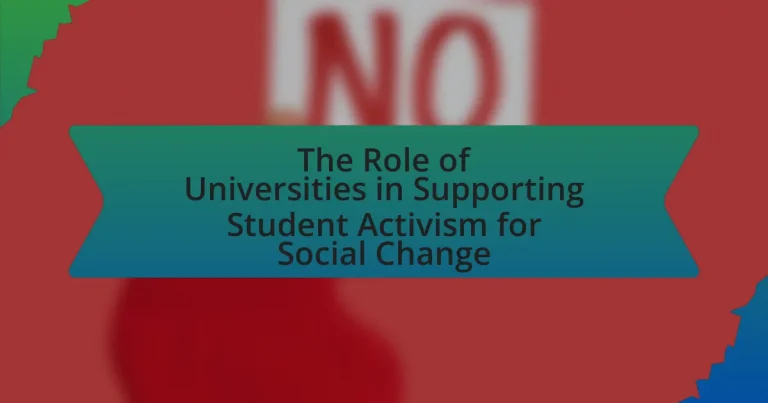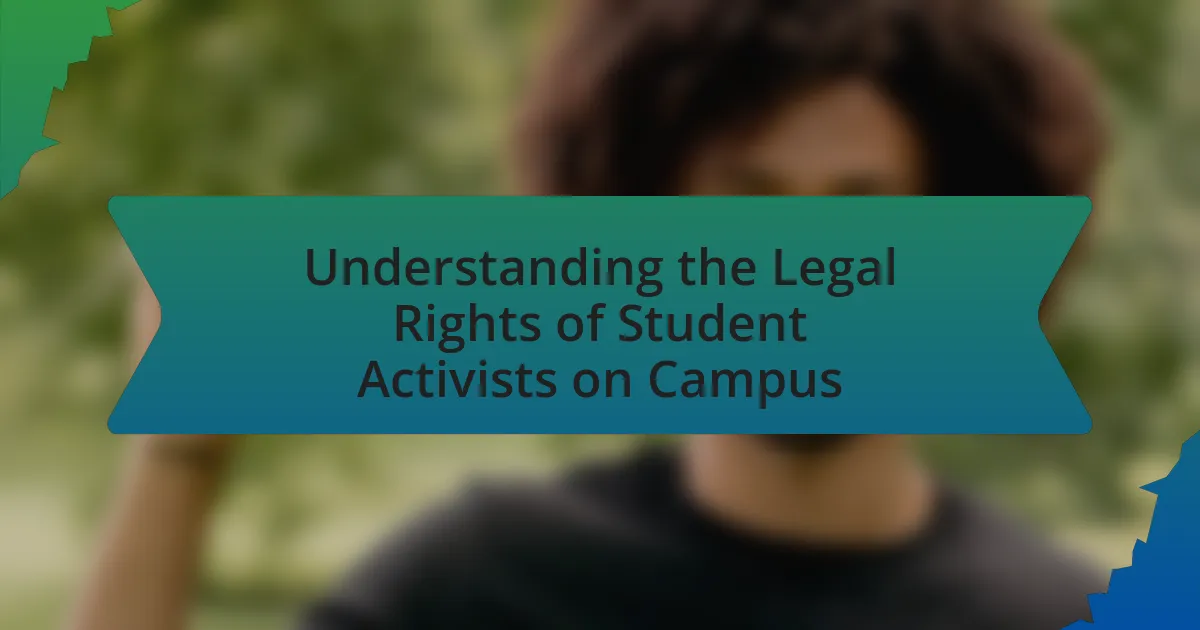Universities play a vital role in supporting student activism for social change by providing essential resources, fostering dialogue, and facilitating organizational structures. They offer platforms such as student organizations, funding, and mentorship, which empower students to engage effectively in activism. The article explores how universities facilitate activism, the resources they provide, the impact of university policies, and the historical significance of student movements. It also addresses the challenges universities face in supporting activism, the influence of campus culture, and future trends in institutional support, highlighting the transformative potential of student activism in shaping public policy and societal norms.

What is the Role of Universities in Supporting Student Activism for Social Change?
Universities play a crucial role in supporting student activism for social change by providing resources, fostering an environment for dialogue, and facilitating organizational structures. They offer platforms such as student organizations, funding for initiatives, and access to faculty mentorship, which empower students to engage in activism effectively. For instance, research from the American Council on Education indicates that institutions that actively support student-led movements contribute to higher levels of civic engagement and social responsibility among graduates. Additionally, universities often host events, workshops, and discussions that encourage critical thinking and awareness of social issues, further enhancing students’ ability to advocate for change.
How do universities facilitate student activism?
Universities facilitate student activism by providing resources, platforms, and institutional support for student-led initiatives. They often establish student organizations and clubs that focus on various social issues, allowing students to organize events, campaigns, and discussions. Additionally, universities may offer funding for activism-related projects and access to facilities for meetings and events. Research indicates that campuses with active student government bodies and dedicated offices for student engagement see higher levels of participation in activism, as these structures create a supportive environment for students to voice their concerns and mobilize for change.
What resources do universities provide to support activism?
Universities provide various resources to support activism, including funding for student organizations, access to meeting spaces, and mentorship programs. Funding allows student groups to organize events, campaigns, and initiatives that promote social change. Meeting spaces facilitate gatherings, discussions, and workshops essential for mobilizing students and fostering collaboration. Mentorship programs connect students with faculty and community leaders who can offer guidance and support in their activism efforts. Additionally, universities often provide training sessions on advocacy, public speaking, and organizing, equipping students with the necessary skills to effectively engage in activism.
How do university policies impact student activism?
University policies significantly impact student activism by shaping the environment in which students organize and express their views. Policies that promote free speech and assembly encourage student engagement in activism, while restrictive policies can hinder their ability to mobilize and advocate for change. For instance, universities with clear guidelines supporting student organizations and protests often see higher levels of activism, as evidenced by the increased participation in movements such as Black Lives Matter on campuses with supportive policies. Conversely, institutions that impose strict regulations on demonstrations or limit funding for activist groups may experience lower levels of student involvement in social issues, as seen in cases where students faced disciplinary actions for protesting. Thus, the nature of university policies directly influences the vibrancy and effectiveness of student activism.
Why is student activism important for social change?
Student activism is important for social change because it mobilizes young people to advocate for issues that affect their communities and society at large. Historically, student movements have played a crucial role in significant social transformations, such as the Civil Rights Movement in the United States, where student-led organizations like the Student Nonviolent Coordinating Committee were pivotal in challenging racial segregation and advocating for equal rights. Additionally, research indicates that student activism fosters critical thinking and civic engagement, equipping future leaders with the skills necessary to address societal challenges. By raising awareness and influencing public policy, student activists contribute to a more informed and active citizenry, driving progress on issues such as climate change, education reform, and social justice.
What historical examples illustrate the impact of student activism?
Historical examples illustrating the impact of student activism include the 1960s Civil Rights Movement in the United States, where students organized sit-ins and protests that significantly advanced racial equality. For instance, the Student Nonviolent Coordinating Committee (SNCC) played a crucial role in voter registration drives and protests against segregation, leading to the passage of the Civil Rights Act of 1964. Another example is the anti-Vietnam War protests, particularly the Kent State University incident in 1970, where student demonstrations against the war culminated in the tragic shooting of four students by the National Guard, which galvanized public opinion against the war and led to widespread changes in U.S. foreign policy. Additionally, the Tiananmen Square protests in 1989 saw students advocating for democratic reforms in China, which, despite a violent crackdown, raised global awareness about human rights issues in the country. These instances demonstrate how student activism has historically influenced social and political change.
How does student activism influence public policy and societal norms?
Student activism significantly influences public policy and societal norms by mobilizing collective action and raising awareness on critical issues. For instance, movements such as the Civil Rights Movement in the 1960s, largely driven by student activists, led to landmark legislation like the Civil Rights Act of 1964, which transformed societal attitudes towards race and equality. Additionally, contemporary student-led initiatives, such as the March for Our Lives, have prompted discussions on gun control policies, demonstrating how organized efforts can shift legislative priorities and public opinion. These examples illustrate that student activism not only advocates for change but also serves as a catalyst for policy reform and the evolution of societal values.
What challenges do universities face in supporting student activism?
Universities face significant challenges in supporting student activism, primarily due to balancing institutional policies with student rights. These challenges include navigating free speech issues, as universities must protect students’ rights to express their views while also maintaining campus order and safety. Additionally, universities often encounter resistance from stakeholders, such as alumni and donors, who may oppose certain activist movements, leading to potential funding implications. Furthermore, administrative bureaucracy can hinder timely responses to student initiatives, creating frustration among activists. According to a 2020 study by the American Association of University Professors, 60% of faculty reported that institutional policies often limit student activism, highlighting the systemic barriers that universities must address to effectively support student-led movements.
How do administrative policies hinder or help activism?
Administrative policies can both hinder and help activism within universities. Policies that promote free speech and support student organizations facilitate activism by providing a framework for students to express their views and organize events. For example, universities that have inclusive policies regarding student groups enable diverse voices to participate in activism, fostering a culture of engagement and social change. Conversely, restrictive policies, such as those limiting protest activities or requiring excessive permits for gatherings, can stifle student activism by creating barriers to organization and expression. Research indicates that universities with supportive administrative policies see higher levels of student participation in activism, as evidenced by increased attendance at protests and events aimed at social change.
What role does campus culture play in shaping activism?
Campus culture significantly influences activism by creating an environment that fosters engagement, dialogue, and collective action among students. This culture is shaped by factors such as shared values, social norms, and institutional support, which can either encourage or hinder student participation in social movements. For instance, universities that promote inclusivity and diversity often see higher levels of activism, as students feel empowered to voice their concerns and advocate for change. Research indicates that campuses with active student organizations and supportive faculty are more likely to produce successful activist initiatives, demonstrating the direct correlation between a positive campus culture and effective activism.
How can universities enhance their support for student activism?
Universities can enhance their support for student activism by providing dedicated resources, such as funding, training, and access to facilities for student-led initiatives. For instance, universities can establish grants specifically for student organizations that promote social change, which has been shown to increase student engagement and activism. Additionally, offering workshops on advocacy, leadership, and organizing can equip students with the necessary skills to effectively mobilize their peers. Research indicates that institutions that actively support student activism through structured programs see higher participation rates in social movements, fostering a more vibrant campus culture.
What best practices can universities adopt to empower student activists?
Universities can empower student activists by providing resources, creating supportive policies, and fostering an inclusive environment. By offering funding for student-led initiatives, universities enable activists to organize events and campaigns effectively. Implementing policies that protect students’ rights to free speech and assembly ensures that activists can express their views without fear of retribution. Additionally, universities can establish mentorship programs that connect student activists with experienced faculty or community leaders, enhancing their skills and networks. Research indicates that institutions that actively support student activism see higher levels of engagement and positive social change, demonstrating the effectiveness of these best practices.
How can universities foster a more inclusive environment for activism?
Universities can foster a more inclusive environment for activism by implementing policies that promote diverse representation and support for marginalized groups. This can be achieved through establishing dedicated offices for diversity and inclusion, which provide resources and training for student organizations focused on social justice issues. Research shows that institutions with active diversity initiatives report higher levels of student engagement in activism, as seen in a study by the American Council on Education, which found that 75% of students felt more empowered to participate in activism when they perceived their university as supportive of diverse voices. Additionally, universities can create safe spaces for dialogue and collaboration among different student groups, facilitating intersectional activism that addresses multiple social issues simultaneously.
What are the future trends in university support for student activism?
Future trends in university support for student activism include increased institutional commitment to social justice initiatives, enhanced funding for student-led projects, and the establishment of formal partnerships between universities and activist organizations. Universities are recognizing the importance of fostering an environment that encourages civic engagement and activism among students, as evidenced by the rise in dedicated resources such as activism centers and mentorship programs. Additionally, data from the 2022 Campus Activism Report indicates that 70% of universities have implemented policies to support student-led movements, reflecting a shift towards prioritizing student voices in institutional decision-making processes.
How is technology changing the landscape of student activism?
Technology is transforming student activism by enhancing communication, mobilization, and awareness. Social media platforms enable students to organize protests, share information, and connect with like-minded individuals rapidly, leading to increased participation in social movements. For instance, the #BlackLivesMatter movement gained momentum through Twitter and Instagram, allowing students to amplify their voices and reach a global audience. Additionally, online petitions and crowdfunding platforms facilitate resource mobilization, making it easier for students to support causes financially. According to a study by the Pew Research Center, 69% of young adults use social media to engage with political issues, illustrating the significant role technology plays in shaping contemporary student activism.
What role will social media play in future activism efforts?
Social media will serve as a crucial platform for future activism efforts by facilitating rapid communication and mobilization among activists. It enables real-time sharing of information, allowing movements to gain momentum quickly, as evidenced by the Arab Spring, where social media played a pivotal role in organizing protests and disseminating information. Furthermore, social media provides a space for marginalized voices to be heard, amplifying issues that may not receive mainstream media attention, which is essential for fostering inclusive activism. The ability to reach a global audience instantly enhances the potential for solidarity and support across borders, making social media an indispensable tool for contemporary and future activism.
What practical steps can students take to engage universities in activism?
Students can engage universities in activism by forming student organizations focused on specific social issues, which allows for collective action and representation. These organizations can host events, workshops, and discussions to raise awareness and mobilize support within the campus community. Additionally, students can collaborate with faculty and administration to create initiatives that align with their activism goals, such as sustainability programs or diversity initiatives.
Furthermore, students can utilize social media platforms to amplify their causes, reaching a broader audience and encouraging participation from the university community. Engaging in peaceful protests or demonstrations on campus can also draw attention to critical issues, fostering dialogue and potential policy changes.
Research indicates that universities that actively support student-led initiatives see increased student engagement and a stronger sense of community, which reinforces the importance of student activism in driving social change.



